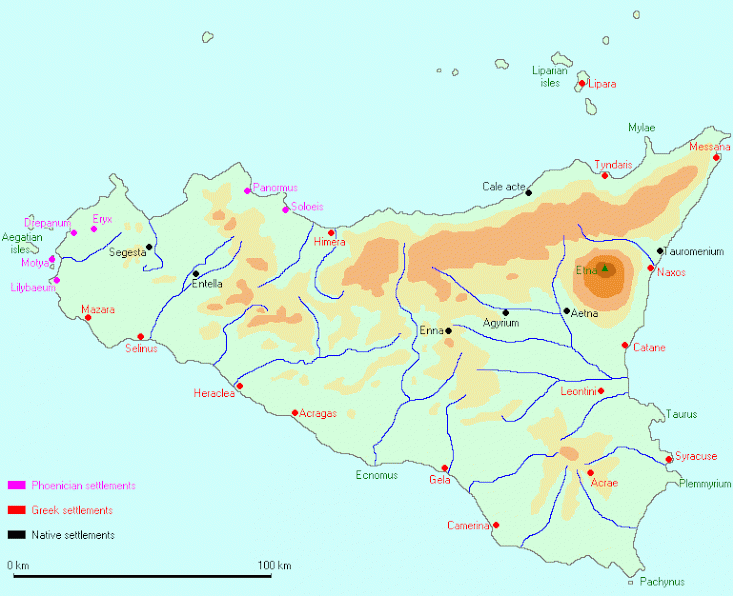Eunus
Eunus: Syrian slave, leader of a revolt on Sicily in 135-132 BCE.

In the mid-third century, the Romans conquered Sicily, and it became a province, ruled by a praetor (governor). Rich Romans owned large country estates on the island, which was rich in corn, and the countryside was crowded by slaves. Sometimes they were prisoners of war, sometimes bought on the slave markets of the eastern Mediterranean (Rhodes and Delos). Often, these slaves belonged to the same ethnic group: e.g., Celtiberians, Syrians, or Thracians.
Their living conditions were not altogether bad, but the fact that they were mixed with people who spoke the same language made it easy for gossip to spread. If something went wrong, every slave knew; when an insurrection was organized, it was easy to inform the people - and the Roman government could be surprised.
This is exactly what happened in 136 or 135 BCE. A slave from Syria named Eunus, together with 400 other runaways, occupied Henna in central Sicily. Our information on this revolt has the shape of a Russian doll. The most important source is the Epitome written by a Roman author named Publius Annius Florus in the early second century CE. This text, which can be found here, is an excerpt from the History of Rome since its foundation by the Roman historian Titus Livy (59 BCE - 17 CE), who in turn used earlier historians to describe the story of Eunus. We do not know which ones, but Polybius of Megalopolis, a contemporary of Eunus, certainly was among them. (Livy's text is summarized in his Periochae.note)
After Eunus' initial success, he was able to gather a larger following, especially since he could claim close ties to the mother goddess Atargatis, a divinity that was popular among the Syrians. She was considered to be the same as the Greek goddess Demeter, who had a famous shrine at Henna. According to Florus
Eunus, counterfeiting an inspired frenzy and waving his disheveled hair in honor of the Syrian goddess, incited the slaves to arms and liberty on the pretense of a command from the gods. In order to prove that he was acting under divine inspiration, he secreted in his mouth a nut which he had filled with sulfur and fire, and, by breathing gently, sent forth a flame as he spoke. This miracle first of all collected 2,000 men from those whom he encountered.
The revolt spread across the island and after the praetor of Sicily had been defeated, the number of rebellious slaves increased to perhaps 20,000. The army of Eunus and another slave leader, Cleon, captured Agrigentum in the south and Tauromenium and Catana in the east. Slave revolts are also known from the Italian mainland (Minturnae and Sinuessa) and even Attica in Greece. There was no coordination between these insurrections, but it seems that Eunus was a source of inspiration to the other slaves in the Roman world. He was recognized as king of Sicily and started to call himself Antiochus, a common king name in Seleucid Syria. Archaeologists have found a small bronze coin, minted at Henna and mentioning king Antiochus.
The revolt could last a very long time, because the Roman government was occupied with another important war, against the Celtiberians in Hispania. This Numantine war lasted ten years (143-133) and proved to be very difficult. Twice, the Romans were severely defeated. In 134, however, they sent their best general, consul Scipio Aemilianus, who restored order and laid siege to the Celtiberian capital Numantia. After a siege of nine months, the town was captured. Now, Rome could deal with Eunus.
However, consul Lucius Calpurnius Piso Frugi had already marched to Sicily and had started to blockade Henna. There is archaeological evidence for his attack, because sling-bullets with the legend "Piso" have been discovered. It was a difficult siege, because Henna lies on a very high mountain. (Centuries later, the Saracens needed 31 years to reduce the stronghold, and the Normans needed a quarter of a century to take the same town.) It is not surprising, therefore, that Piso could not finish the war. Besides, at Rome, there were great political tensions, related to the reform bills of the tribune Tiberius Sempronius Gracchus.
Next year, 132, the war was continued by consul Publius Rutilius, with an army that had been increased with troops from Hispania. This brought the war almost to an end and the situation on the island was normalized. Therefore, it was the praetor who was responsible for the ultimate defeat of the slaves, as Florus says.
At last punishment was inflicted upon them under the leadership of Perperna, who, after defeating them and finally besieging them at Henna reduced them by famine as effectually as by a plague and requited the surviving marauders with fetters, chains and the cross.
Under normal circumstances, a successful general would be rewarded with a triumphal entry into the city. However, Perperna had defeated mere slaves, and therefore, he had to be content with a minor procession (ovatio). His real reward came in 130, when he was the first of his family to be elected consul.
Eunus had been taken captive and was brought to Rome, where he died. It was not exactly the type of death fitting for a king, but Eunus left a legacy: during the next two or three generations, Sicily and Italy were to see more slave revolts. In 104-101, Salvius Trypho and Athenio revolted on Sicily, and in 73-71, Italy was in great turmoil because of the insurrection led by the famous slave leader Spartacus.